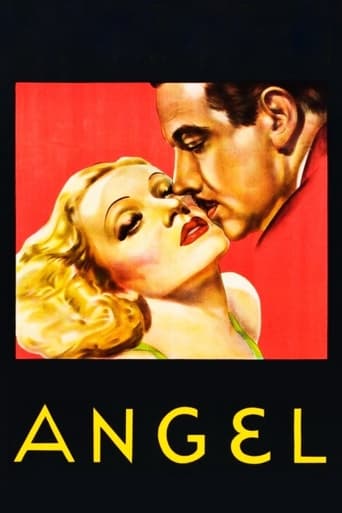harveyvincent-38279
I've seen all of Lubitsch's films and I rate Angel as his worst. The faults are in a bland repetitive script and the strangely ambiguous, wooden performance of Marlene Dietrich. There are times she appears more masculine than her costars Melvyn Douglas and Herbert Marshall.The sexual playfulness and subtle daring - so delightfully evident in Lubitsch's other films - here often fall flat. Made a few years before Angel, one of Ernst Lubitsch's best films, also based on a play (Noël Coward's Design for Living), has a woman at the center of a love triangle. The shock, particularly for a 30s Hollywood movie, is that the three live together in a bohemian Paris flat. In his directing, as well as the performances of Frederic March and Gary Cooper, there is never a hint of homo-eroticism. Ironically in Angel the best scene, a climactic one between Douglas and Marshall, is full of sexual energy.Subtle sophistication was always an Ernst Lubitsch trademark. There is little evidence of sparkling wit and originality in Angel.
blanche-2
"Angel" from 1937 is a Dietrich-Lubitsch collaboration that didn't come off - in fact, this was the last film Dietrich made for Paramount, after which she was labeled box-office poison. You can see why this film didn't help, though she is photographed like a dream and dressed divinely by Travis Banton.Based on a play, this is a rather dull story. The neglected, bored wife, Maria (Dietrich) of a very busy diplomat (Herbert Marshall) flies to Paris and goes to a salon run by a countess (Laura Hope Crews) who is an old friend of hers. It's apparently a high-class brothel. While waiting to see her, she meets Tony Halton (Melvyn Douglas), looking for a delightful evening. She agrees to meet him for dinner. The affair isn't shown, but one assumes they consummated their relationship. She disappears without telling him her name or her knowing his.Later on, he runs into an old friend, who is Maria's husband. Maria and Tony meet again - under awkward circumstances.This isn't a comedy, and it really isn't much of a drama either, with dull spots enlivened by the supporting cast - Crews, Edward Everett Horton, and Ernest Cossart, who plays the butler. (He tells his fiancée over the phone, "If you don't tell me where you learned to rumba, we're through.")Directed with the usual Lubitsch subtlety, this is just okay, lacking the bubbly champagne touch that made Lubitsch's work in films like "The Shop Around the Corner," "Ninotchka," "To Be or Not to Be" and so many other great films of his.
danland2
Wonderful Lubitsch comedy about a distracted husband, a neglected wife and an ardent suitor that has all the magic, humor, romance of the directors previous work. Dazzling camera work by Charles Lang make Deitrich look positively luminous. All the cast are perfect. The audience I saw this with at the LACMA Museum screening were utterly entranced by this neglected masterwork. Kudos to UCLA for restoring this treasure to its original splendor and to LACMA programer Ian Birnie for giving us the opportunity to see this little gem in all its glory. A 10 out of 10.........
sandy-32
Given the talent involved -- Dietrich at the height of her allure, Melvyn Douglas (who proved such a wonderful foil to Garbo just two years later in "Ninotchka"), support from such able troupers as Edward Everett Horton and Laura Hope Crews, and above all the famed "touch" of Lubitsch -- "Angel" should be a sparkling romp, a melancholy romance of renunuciation, a worldly social comedy, or better yet, all three.Instead it's a mostly tiresome slog through familiar territory, as if all involved were inspired not by Dietrich or Lubitsch but by the stolid Herbert Marshall as Marlene's aristo-Brit husband.While several recent writers on both Dietrich and Lubitsch have tried to tout this as an undeservingly overlooked film, it's really most worth watching for Crew's pre-Pittypat turn as a Russian emigre-turned-nightclub-hostess, and her few brief scenes can hardly save the picture.Dietrich fans are better off hunting up stills -- she does look terrific in the wardrobe of English Gentlewoman tweeds and furs, and her legendary collection of emeralds were rarely shown to better advantage.


